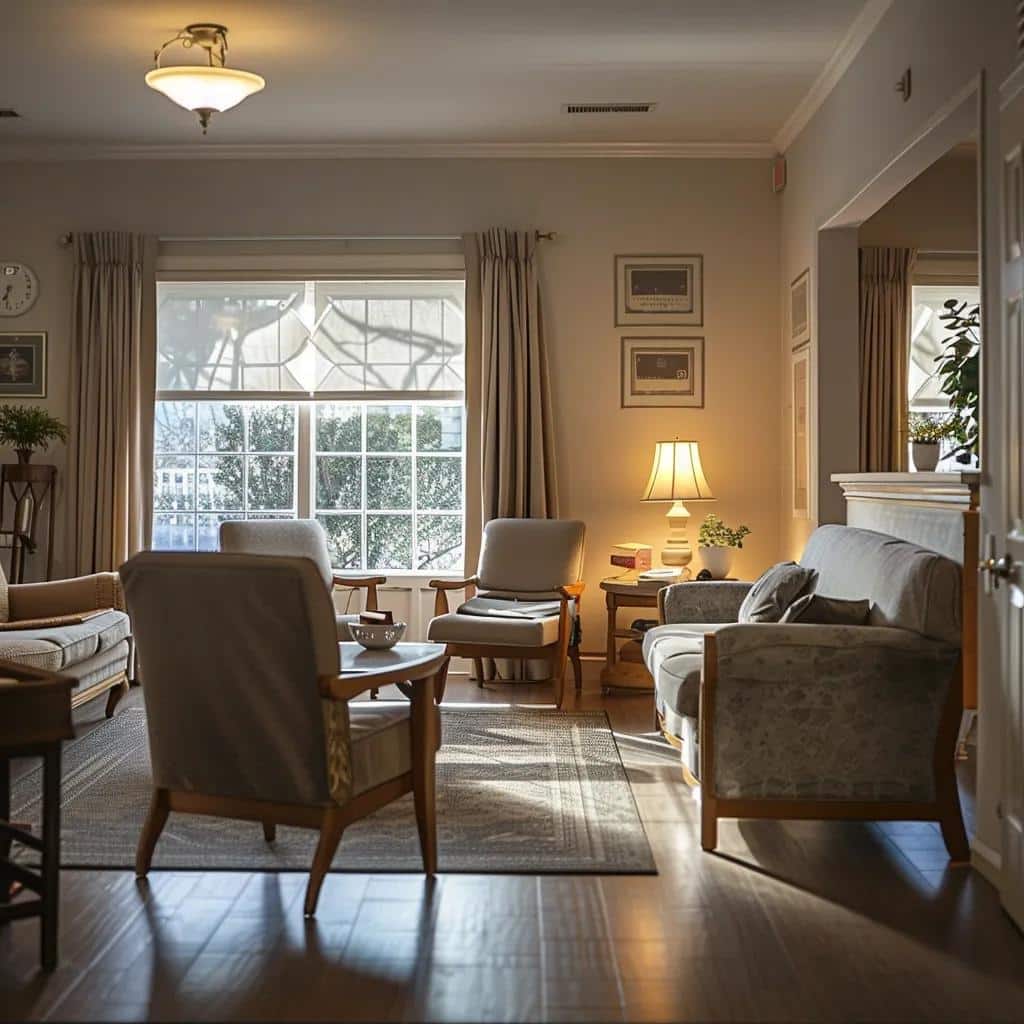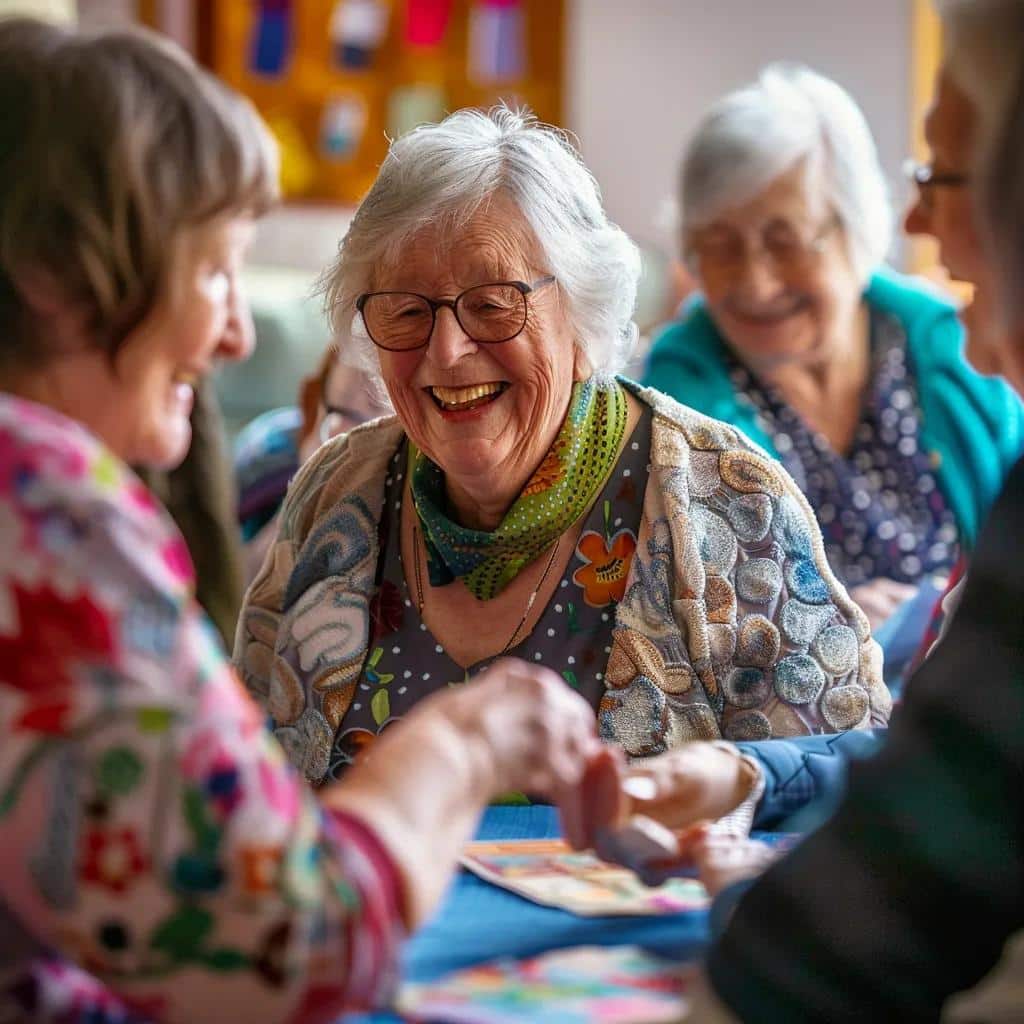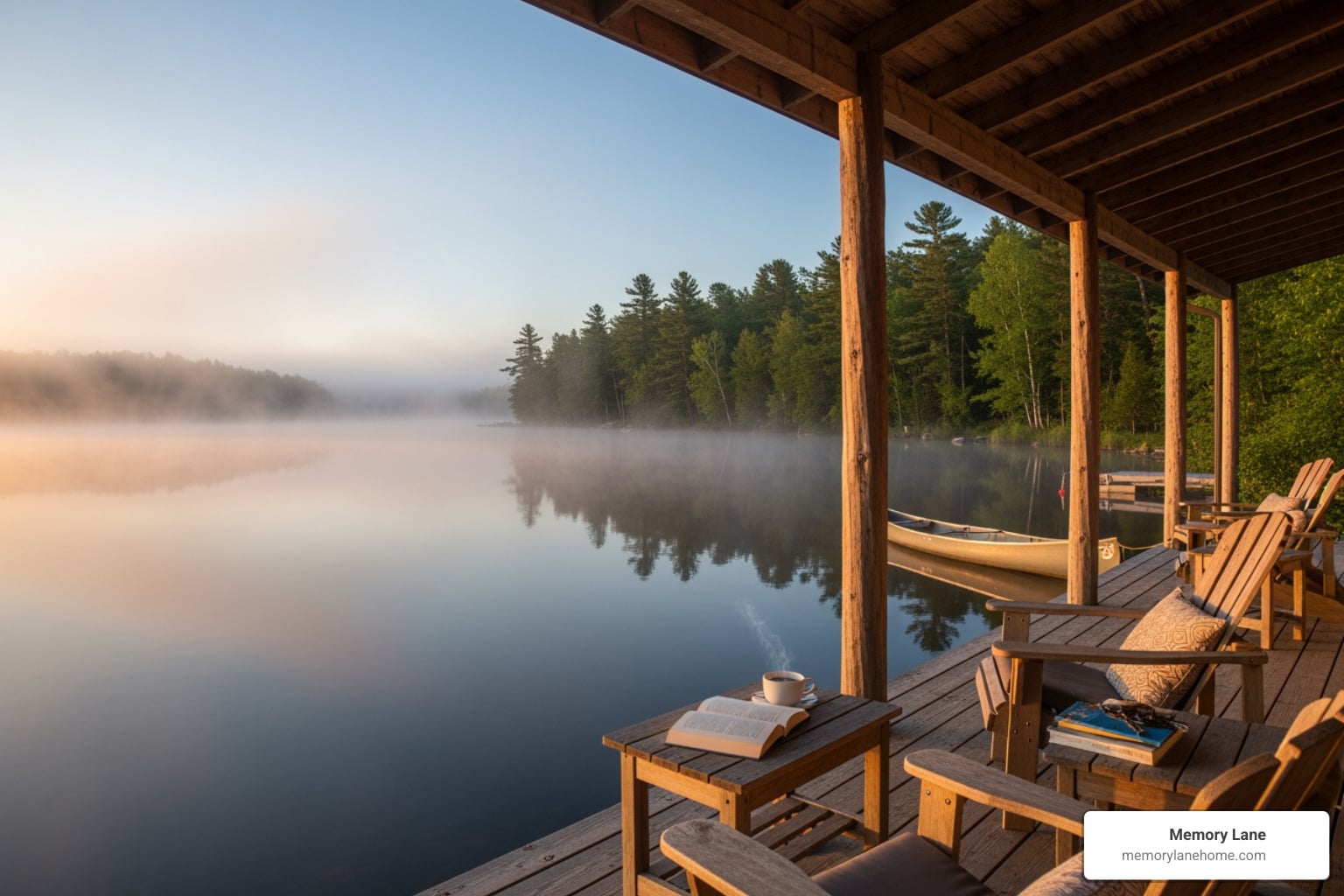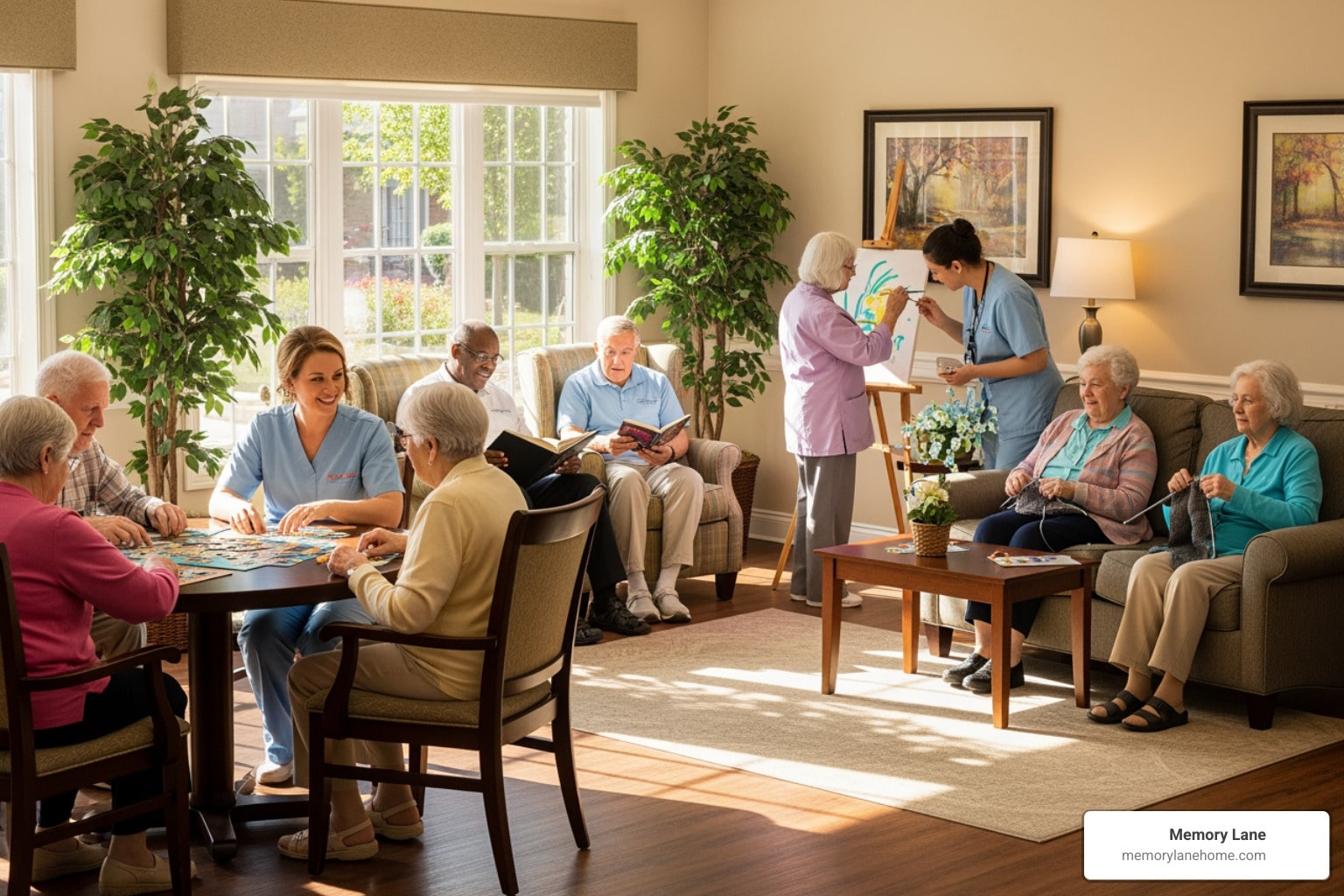Your guide to assisted living Michigan: explore costs, services, financial aid, and top communities for senior care.

Comprehensive Insights on Nearby Alzheimer’s Care Facilities
Comprehensive Insights on Nearby Alzheimer’s Care Facilities

Dementia Care Homes Near You: What to Look For When Choosing Alzheimer’s Care Facilities Nearby


Over 6 million Americans live with Alzheimer’s disease, so identifying the right dementia care home near you can determine the safety, comfort, and cognitive support your loved one receives. This guide defines what constitutes a dementia care home, outlines the key factors—such as personalized care plans, staffing ratios, specialized training, safety features, activities, nutrition, and location—to evaluate facilities, lists essential touring questions, summarizes cost ranges and financial aid options, and highlights how Memory Lane Home’s values and services in Ypsilanti and Ann Arbor deliver a home-like environment with individualized attention. By following these steps, families can navigate Alzheimer’s care facilities nearby with confidence and compassion.
What Are Dementia Care Homes and How Do They Support Alzheimer’s Care?
Dementia care homes are specialized residential facilities designed to support individuals with Alzheimer’s disease and other forms of cognitive decline through tailored services, structured routines, and a secure environment that promotes dignity and engagement. They combine medical oversight, therapeutic activities, and memory‐focused support to slow progression of symptoms and maintain daily functioning. Understanding these homes’ defining features helps families distinguish them from general senior living options and choose the right level of Alzheimer’s care.
What Defines a Dementia Care Home?
A dementia care home is a residential setting licensed to provide 24-hour supervision, structured memory support programs, and staff trained in cognitive impairment management to enhance quality of life and minimize confusion. Families should look for:
- Specialized staff who understand Alzheimer’s behaviors and communication strategies
- Secure design elements that prevent wandering and promote orientation
- Personalized daily routines that integrate cognitive stimulation, social engagement, and safe mobility
These defining characteristics ensure residents receive consistent, expert care tailored to evolving memory needs, paving the way for exploring how dementia care homes differ from other senior living environments.
Defining Dementia Care Homes
Dementia care homes are designed to provide specialized support for individuals with Alzheimer’s and other forms of cognitive decline. These facilities offer tailored services, structured routines, and a secure environment to promote dignity and engagement, which helps to slow the progression of symptoms and maintain daily functioning.
This definition helps to distinguish dementia care homes from other senior living options, highlighting their focus on memory-specific programs.
How Do Dementia Care Homes Differ from Other Senior Living Options?
Dementia care homes focus exclusively on cognitive support, whereas other senior living options may prioritize independence or nursing care without memory-specific programs.
This comparison highlights that dementia care homes integrate therapeutic memory activities and design features not routinely found in assisted living or nursing settings, leading into the variety of care levels available.
What Types and Levels of Dementia Care Are Available?
Memory support services span from early-stage assisted living programs to secure memory care units for advanced Alzheimer’s, each structured to match cognitive and functional abilities.
- Early-Stage Support offers assistance with medication, meal routines, and social engagement while encouraging independence.
- Standard Memory Care provides enriched cognitive activities, behavioral management techniques, and enhanced supervision.
- Secure Alzheimer’s Unit ensures locked access, continuous monitoring, and specialized interventions for wandering or safety risks.
Families should align their loved one’s current cognitive and care requirements with these levels, transitioning seamlessly as memory needs evolve.
What Are the Key Factors to Look For in Dementia Care Homes Near You?
Evaluating dementia care homes requires attention to clinical expertise, individualized planning, environment design, and family accessibility. Key factors include personalized care plans, staffing ratios, staff training, safety features, engaging therapies, nutrition, and location—each contributing to a resident’s well-being and family peace of mind.
How Important Are Personalized Care Plans in Dementia Care?


Personalized care plans establish individualized goals based on medical history, daily preferences, and cognitive assessments to optimize comfort and independence.
- Assessment-Driven Goals ensure care evolves with changes in memory and behavior.
- Resident Preferences guide personalized activity schedules and comfort measures.
- Family Collaboration involves relatives in plan updates and decision-making.
These tailored plans foster trust and engagement, setting the stage for understanding how staff ratios affect care quality.
What Is the Ideal Caregiver-to-Resident Ratio for Quality Alzheimer’s Care?
An ideal caregiver-to-resident ratio in dementia care homes is around one caregiver for every five to six residents to guarantee personalized attention, rapid response to needs, and consistent relationship building.
Maintaining this ratio supports stronger emotional connections and effective behavior management, leading to better overall quality of care.
Ideal Caregiver-to-Resident Ratio
An optimal caregiver-to-resident ratio in dementia care homes is around one caregiver for every five to six residents. This ratio allows for personalized attention, quick responses to needs, and the building of consistent relationships, which are crucial for effective behavior management and overall quality of care.
This staffing level supports stronger emotional connections and better care outcomes for residents.
How Does Staff Training Impact Dementia Care Quality?
Staff training in Alzheimer’s-specific techniques equips caregivers with communication methods, behavioral intervention strategies, and dementia-friendly care protocols that reduce agitation and improve daily engagement.
- Behavioral Management skills help de-escalate confusion or distress.
- Validation Techniques reinforce resident dignity and self-expression.
- Ongoing Education keeps caregivers current on Alzheimer’s research and best practices.
Highly trained staff deliver safer, more compassionate care, underscoring the necessity of safety features in facility design.
What Safety Features Should a Dementia Care Facility Have?
Safety in dementia care homes relies on environmental design and technology to prevent accidents and wandering. Essential features include:
- Secured Exits and Alarms to prevent unsupervised departures
- Clear Wayfinding through color-coded hallways and visual cues
- Non-Slip Flooring and Handrails to reduce fall risk
- 24/7 Monitoring Systems for continuous resident supervision
These protective measures create a secure setting that allows residents to explore and engage with minimal risk.
Which Activities and Therapies Benefit Dementia Residents?


Engaging activities and therapies promote cognitive function, social interaction, and emotional well-being through evidence-based approaches.
- Reminiscence Therapy uses familiar music, photos, and stories to spark memory recall.
- Art and Music Programs encourage creative expression and sensory stimulation.
- Cognitive Games and Puzzles maintain neural pathways and problem-solving skills.
- Gentle Exercise (walking groups, chair yoga) supports physical health and mobility.
Benefits of Activities and Therapies
Engaging activities and therapies, such as reminiscence therapy, art and music programs, cognitive games, and gentle exercise, are essential for promoting cognitive function, social interaction, and emotional well-being in dementia residents. These evidence-based approaches enhance the quality of life and prepare residents for community events.
Offering a balanced schedule of mental, social, and physical activities enhances the quality of life for residents.
How Does Nutrition and Dining Support Dementia Care?
Nutrition tailored to dementia care needs combines texture-appropriate meals, nutrient-dense ingredients, and social dining environments to encourage appetite and hydration. Care plans often include:
- Adaptive Utensils and Plateware for motor challenges
- Finger-Food Options for those with chewing or swallowing difficulties
- Family-Style Meals to foster social connection and routine
Proper dining support underpins overall health and reinforces the structure introduced by personalized care plans.
Why Is Location and Accessibility Important for Families?
Proximity of dementia care homes to family members and medical resources reduces travel stress, ensures prompt involvement in care, and facilitates quick access to specialized treatments when needed. Choosing a facility near familiar neighborhoods or healthcare providers fosters continuity of care and family engagement.
What Questions Should Families Ask When Touring Dementia Care Homes?
Touring a dementia care home becomes meaningful when families ask targeted questions that reveal the quality of care, environment, and financial transparency. A concise checklist ensures all critical aspects are covered during visits.
- What processes guide development and updates of personalized care plans?
- How many caregivers are on duty per shift and what are their qualifications?
- Which safety protocols and design features prevent wandering and falls?
- What types of activities, therapies, and social programs are offered weekly?
- How are meal plans designed for cognitive and physical health needs?
- What are the full breakdown of fees, payment schedules, and financial aid options?
Which Questions Reveal the Quality of Personalized Care?
When evaluating care plans, ask staff to describe:
- Assessment Frequency – How often do you reassess cognitive and physical needs?
- Family Involvement – In what ways can relatives contribute to plan updates?
- Adaptation Protocol – How quickly are changes implemented when a resident’s condition shifts?
Answers demonstrate the facility’s commitment to truly individualized support.
How to Assess Staff Expertise and Caregiver Ratios?
Inquire about:
- Training Requirements – What dementia-specific certifications do staff hold?
- Staffing Levels – How many caregivers are assigned per resident each day?
- Supervision Structure – Who oversees caregiver performance and ongoing education?
Clear responses indicate reliable oversight and sufficient staffing for quality Alzheimer’s care.
What to Ask About Safety and Facility Design?
Focus on physical safeguards by asking:
- Which exit points are secured and how are alarms managed?
- What design features help residents with memory loss navigate independently?
- How are fall risks assessed and mitigated throughout the home?
Understanding these precautions shows how the environment supports daily well-being.
How to Inquire About Activities, Programs, and Social Engagement?
Discover program depth by asking:
- What is your weekly schedule of cognitive and recreational therapies?
- How do you tailor activities to individual interests and abilities?
- Are family members invited to participate in special events or group sessions?
Comprehensive programming signals a resident-focused approach to engagement and enrichment.
What Financial and Payment Questions Are Essential?
Ensure cost transparency by clarifying:
- What exactly is included in the monthly rate and what constitutes an extra charge?
- Do you offer payment plans, sliding-scale options, or financial counseling?
- How do you coordinate billing with Medicaid, long-term care insurance, or VA benefits?
Complete clarity on fees prevents surprises and helps families plan long-term.
Essential Criteria for Choosing Nearby Alzheimer’s Care Homes
Memory care costs vary by region, level of support, and facility amenities, but families can explore typical price ranges and aid programs to offset expenses of Alzheimer’s care.
What Are Typical Memory Care Costs Near You?
In most Midwestern communities, monthly memory care fees range between $4,500 and $7,500 depending on the level of supervision, room type, and included services.
Understanding these normal ranges empowers families to match budget constraints with care requirements.
How Does Medicaid Support Dementia Care Expenses?
Medicaid may cover a portion of long-term care costs for eligible seniors through home- and community-based waivers or facility-based benefits, subject to income and asset thresholds. Families often work with financial counselors to complete applications and document medical necessity.
What Role Does Long-Term Care Insurance Play?
Long-term care insurance policies can reimburse daily care charges up to policy limits, easing the financial burden of assisted living or memory care. Coverage levels vary, so reviewing benefit triggers and caps with an insurance specialist ensures maximum reimbursement.
Are VA Benefits Available for Dementia Care?
Veterans and surviving spouses may qualify for Aid & Attendance or Housebound allowances through the U.S. Department of Veterans Affairs, which can supplement costs of assisted living or memory care services when eligibility criteria are met.
What Makes Memory Lane Home’s Dementia Care Unique in Ypsilanti and Ann Arbor?
Memory Lane Home offers a specialized assisted living and memory care environment in Ypsilanti and Ann Arbor that balances clinical expertise with the warmth of a private residence. Our home-like setting, personalized programs, elevated staffing levels, and family support resources distinguish us as a trusted choice for Alzheimer’s care nearby.
How Does Memory Lane Home Provide Personalized Dementia Care?
Memory Lane Home begins each resident relationship with a comprehensive cognitive and lifestyle assessment that informs a dynamic care plan. Regular plan reviews and family conferences guarantee that evolving needs and personal preferences remain central to daily routines.
What Benefits Does a High Caregiver-to-Resident Ratio Offer?
With a ratio of approximately one caregiver for every five residents, our team delivers frequent one-on-one interactions, quicker response times, and deeper familiarity with each resident’s routines and triggers—promoting emotional well-being and reducing anxiety.
How Is the Home-Like Environment Designed to Support Residents?
Our facility replicates residential comforts—private bedrooms, communal living rooms, and a dementia-friendly garden—to reduce disorientation and foster a sense of belonging. Soft lighting, personalized décor, and familiar household items contribute to a soothing atmosphere.
What Family Support and Community Engagement Does Memory Lane Home Offer?
We host monthly caregiver support groups, educational workshops, and intergenerational events to strengthen family involvement and combat caregiver burden. Partnerships with local senior centers and volunteer organizations bring additional social opportunities and resources into our memory care community.
How Can You Schedule a Tour or Contact Memory Lane Home?
To experience our approach firsthand, families may call our Ypsilanti or Ann Arbor residence during business hours for a guided tour or request a virtual visit. Our admissions team provides personalized consultations to discuss care needs, available openings, and financial planning.
Choosing the right dementia care home involves weighing multiple factors—from individualized care plans and staffing expertise to safety design and cost options. Memory Lane Home’s specialized services in Ypsilanti and Ann Arbor combine a high caregiver-to-resident ratio, dementia-focused therapies, a home-like environment, and robust family support to create a trusted Alzheimer’s care setting nearby. Contact our team to arrange a personalized visit, explore financial aid solutions, and take the next step toward compassionate, memory-centered care for your loved one.
Frequently Asked Questions
What should I consider when touring a dementia care home?
When touring a dementia care home, focus on the environment, staff interactions, and available activities. Observe how staff engage with residents and whether they seem attentive and compassionate. Ask about the daily schedule, types of therapies offered, and how they adapt activities to individual needs. Additionally, inquire about safety features and how the facility ensures a secure environment. This comprehensive approach will help you gauge the quality of care and the overall atmosphere of the home.
How can I assess the quality of activities offered in dementia care homes?
To assess the quality of activities in dementia care homes, ask about the variety and frequency of programs available. Inquire whether activities are tailored to residents’ interests and cognitive abilities. Look for evidence-based therapies, such as reminiscence therapy or art programs, that promote engagement and cognitive function. Additionally, check if family members can participate in activities, as this can enhance social interaction and strengthen bonds, making the environment more supportive for residents.
What role do family members play in the care of residents in dementia care homes?
Family members play a crucial role in the care of residents in dementia care homes by participating in care planning and regular assessments. They can provide valuable insights into the resident’s preferences, history, and evolving needs. Many facilities encourage family involvement through meetings, support groups, and events, fostering a collaborative approach to care. This engagement not only enhances the quality of care but also helps families feel more connected and informed about their loved one’s well-being.
How can I ensure my loved one receives appropriate nutrition in a dementia care home?
To ensure your loved one receives appropriate nutrition in a dementia care home, inquire about the meal planning process and how it accommodates individual dietary needs. Ask if the facility offers texture-modified meals for those with chewing or swallowing difficulties. Additionally, check if they provide adaptive utensils and family-style dining options to encourage social interaction. Regular assessments of residents’ nutritional needs should also be part of the care plan to maintain overall health and well-being.
What are the benefits of a home-like environment in dementia care homes?
A home-like environment in dementia care homes offers numerous benefits, including reduced anxiety and increased comfort for residents. Familiar settings, such as private bedrooms and communal living spaces, help residents feel more at ease and less disoriented. Soft lighting, personalized décor, and familiar household items contribute to a soothing atmosphere that promotes emotional well-being. This environment encourages social interaction and engagement, which are vital for maintaining cognitive function and enhancing the quality of life for individuals with dementia.
How can I find financial assistance for dementia care services?
Finding financial assistance for dementia care services can involve exploring various options, including Medicaid, long-term care insurance, and veterans’ benefits. Medicaid may cover some long-term care costs for eligible individuals, while long-term care insurance can reimburse daily care expenses. Additionally, veterans and their families may qualify for specific benefits through the U.S. Department of Veterans Affairs. Consulting with a financial advisor or counselor can help families navigate these options and identify the best solutions for their situation.
Conclusion
Choosing the right dementia care home is essential for ensuring your loved one receives the personalized support and safety they need. By focusing on key factors such as caregiver ratios, specialized training, and engaging activities, families can find a facility that enhances quality of life. Memory Lane Home in Ypsilanti and Ann Arbor exemplifies these values, offering a nurturing environment tailored to individual needs. Contact our team today to schedule a tour and discover how we can support your family’s journey in Alzheimer’s care.


